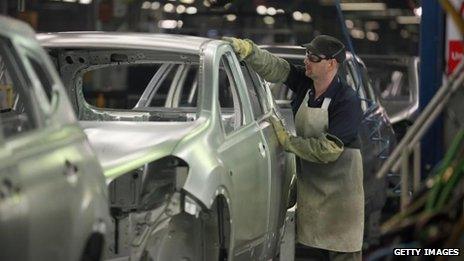Is the UK becoming more productive?
- Published
- comments

Well, well, well. UK productivity - the output of British workers - may be improving at long last.
That is the implication of the latest survey of business conditions by the Bank of England's agents, and it is the hope of the Bank's Monetary Policy Committee (MPC).
Why does that matter?
Well it means that pay can at long last start to rise a little bit faster, without either undermining the competitiveness of British businesses or fuelling a rise in inflation.
That said there is highly unlikely to be a sudden splurge of super generous pay awards (what is that you say? "Unless you happen to be a FTSE chief executive or a top banker". Hmmm).
Both MPC and agents seem fairly relaxed that there is sufficient spare capacity in the economy, even with unemployment still falling reasonably fast (though at a slower rate), for companies not to feel under pressure to award fat salary increments.
That said, salaries for new recruits are rising - so maybe it is time for us all to hawk our services.
But there is disagreement on the MPC about the magnitude of slack in the economy.
The main disputed issue is whether continued substantial increases in the numbers of the self employed are a lifestyle choice or a reaction to a shortage of employment opportunities.
In other words, are the self-employed a pool of available labour available to be tapped by companies wishing to expand?
The Bank of England ain't sure.
What it was absolutely sure about - at the MPC meeting on 9 April - was that there was no reason to raise interest rates or shrink the £375bn of new money it created through quantitative easing. The vote to maintain the current stance of monetary policy was unanimous.
The members seem confident there is no serious looming risk of inflation surging well above target - and I would not be surprised if investors were to revise their view that the Bank's policy rate will rise in the spring of 2015, and speculate on the basis that rates will rise a few months later.
That would presumably please a prime minister who may be mildly anxious about the electoral impact of an interest rate rise weeks before a general election.
However, for me the most interesting section of the Bank of England's ruminations relates to the prospects for China (yes, yes, I know I am a bit boring about this).
Members of the MPC are taking seriously the risk "of a disorderly response in financial markets, with possibly large spillovers to other countries, if a slowdown [in China] were to be caused by instability in the Chinese financial system".
And, what's worse, the Bank of England's ability to offset the potential harm is constrained by the conspicuous fact that interest rates here and in most of the rich west are still pretty much as low as they can go.
So to tell you what you already know, it would be much better for us if the Chinese bubble - if that is what it is - were pricked in 18 months' time rather than any time soon.
Because by the end of 2015, presumably our economy will be stronger, and our interest rates would be higher, such that the Bank of England would have weapons and armour available to protect us from whatever shrapnel hits us from the explosion (one of the many great things about higher interest rates is that they can be cut in a crisis - gawd I make staggeringly obvious statements sometimes).
UPDATE 16:10
The Bank of England has also increased its projections for growth in GDP or national output, to a fairly rapid 1% in both the first and second quarters of the current year - which would be back to growth rates we haven't seen since before the 2008 crash.
Also an authoritative survey by the business lobby group, the CBI, shows that manufacturers are now at their most optimistic for more than 40 years - and are enjoying increases in orders they've not seen since the mid-1990s.
That said, these days manufacturing represents just 10% of the economy, compared with 30% in the 1970s - although surveys of the much bigger service sector are also encouraging.
One note of caution. That last record level for manufacturing was in 1973 - shortly before the UK economy went to hell in a handcart of soaring oil prices, power cuts and industrial strife.